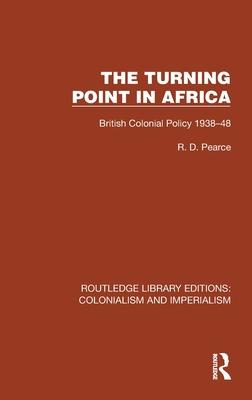The Turning Point in Africa (1982) is a significant study of British colonial policy towards tropical Africa during a critical decade, from the complacent trusteeship of the inter-war years to the strategy of decolonization inaugurated after the Second World War. Charting a course through a wide variety of official sources and private papers, the work assesses the importance for colonial policy of the Colonial Office, the Colonial Service, the Labour Party, African nationalists, and of ideological and moral preconceptions. The revolution in African policy is investigated with a wide and yet detailed approach. Special attention is devoted to the effects of the Second World War on Britain and its empire and to the importance of American anti-imperialist pressure on the British Government. The importance of three men - the adviser Lord Hailey, politician Arthur Creech Jones and civil servant Andrew Cohen - receives attention and an assessment is made of their contribution to a policy which, from 1948 onwards, led to a rapid decolonization in large parts of Africa. The significance of this policy is analysed in detail. The British aimed at ’nation-building’ indirect rule was to be replaced by the forms of English-style local government while rapid constitutional progress at the centre was to be conceded, in accordance with a preconceived model, once powerful nationalist movements had arisen. However, as the book shows, progress at the centre was introduced prematurely and outstripped reform in local government so that progress was not the balanced development the British had wished to see. Decolonization had been given an irreversible momentum by British planning.
| FindBook |
有 1 項符合
Turning Point in Africa: British Colonial Policy 1938-48的圖書 |
 |
Turning Point in Africa: British Colonial Policy 1938-48 作者:Pearce 出版社:Routledge 出版日期:2023-05-03 語言:英文 規格:精裝 / 234頁 / 普通級/ 初版 |
| 圖書館借閱 |
| 國家圖書館 | 全國圖書書目資訊網 | 國立公共資訊圖書館 | 電子書服務平台 | MetaCat 跨館整合查詢 |
| 臺北市立圖書館 | 新北市立圖書館 | 基隆市公共圖書館 | 桃園市立圖書館 | 新竹縣公共圖書館 |
| 苗栗縣立圖書館 | 臺中市立圖書館 | 彰化縣公共圖書館 | 南投縣文化局 | 雲林縣公共圖書館 |
| 嘉義縣圖書館 | 臺南市立圖書館 | 高雄市立圖書館 | 屏東縣公共圖書館 | 宜蘭縣公共圖書館 |
| 花蓮縣文化局 | 臺東縣文化處 |
|
|
圖書介紹 - 資料來源:博客來 評分:
圖書名稱:Turning Point in Africa: British Colonial Policy 1938-48
|











